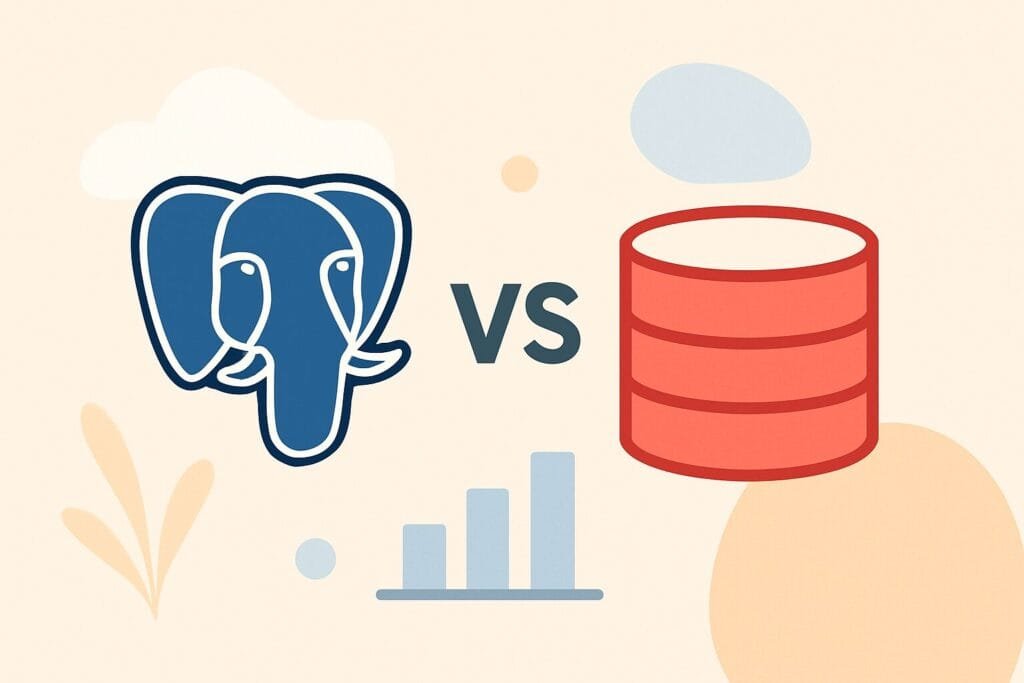When it comes to enterprise-level database management systems (DBMS), two of the most popular choices are PostgreSQL and Oracle Database. Both are powerful, secure, and scalable, but they differ in cost, flexibility, performance, and ecosystem. Choosing the right one can impact an organization’s operational efficiency, IT budget, and long-term scalability. In this article, we will compare PostgreSQL vs Oracle in detail to help enterprises decide which database solution best fits their needs.

Overview of PostgreSQL
PostgreSQL is a free, open-source, object-relational database system that has been actively developed for over 30 years. Known for its reliability, data integrity, and advanced features, PostgreSQL is widely adopted by startups, mid-sized companies, and even large corporations. It supports JSON, XML, and traditional relational structures, making it highly versatile for modern application development.
Overview of Oracle Database
Oracle Database is a commercial, enterprise-grade relational database system developed by Oracle Corporation. It is widely recognized for its scalability, high availability, and advanced security features. Oracle is often used by Fortune 500 companies, banks, and government institutions that require mission-critical data management. With decades of development, Oracle has one of the most mature ecosystems in the database world.
PostgreSQL vs Oracle: Key Differences
The table below highlights the major differences between PostgreSQL and Oracle:
| Feature | PostgreSQL | Oracle |
|---|---|---|
| License | Open-source (free under PostgreSQL License) | Commercial (paid licenses, subscription costs) |
| Cost | No licensing cost, lower TCO | High licensing fees, costly support |
| Scalability | Supports high scalability, especially with cloud | Highly scalable, designed for large enterprises |
| Performance | Excellent for OLTP and analytical workloads | Optimized for very large datasets and mission-critical workloads |
| Community Support | Strong global open-source community | Official Oracle support, enterprise-level SLAs |
| Extensions & Flexibility | Supports extensions like PostGIS, customizable | Proprietary features, less flexible for modifications |
| Cloud Integration | Works with AWS RDS, Azure, GCP, etc. | Available in Oracle Cloud, also works with multi-cloud |
| Use Cases | Startups, SaaS apps, analytics, research | Banks, telecom, government, mission-critical apps |
Cost Considerations
One of the biggest factors in the PostgreSQL vs Oracle debate is cost. PostgreSQL is completely free, making it highly attractive for companies that want enterprise-level performance without expensive licensing fees. Oracle, on the other hand, can cost thousands or even millions of dollars annually depending on the organization’s scale and requirements. However, Oracle provides guaranteed enterprise-level support, which some companies consider worth the price.
Performance and Scalability
Both databases offer strong performance, but the difference lies in scale. PostgreSQL performs extremely well for most workloads, especially transactional systems and analytics. However, Oracle is optimized for very large-scale systems that handle billions of transactions per day. For enterprises with mission-critical applications, Oracle’s proven track record of performance at scale is hard to beat.
Community and Support
PostgreSQL has a vibrant open-source community, with frequent updates, bug fixes, and third-party extensions. Enterprises using PostgreSQL can also opt for professional support from vendors like EDB (EnterpriseDB). Oracle, being commercial software, comes with official vendor support and enterprise-grade SLAs, which is often a key requirement for large companies.
Flexibility and Extensions
PostgreSQL is highly flexible and allows developers to build custom extensions. For example, PostGIS adds powerful geospatial capabilities. Oracle, while extremely robust, is proprietary, meaning customization and integration flexibility are limited compared to PostgreSQL. This makes PostgreSQL attractive for innovation-driven enterprises.
Cloud Integration
In today’s cloud-first world, both databases integrate well with cloud platforms. PostgreSQL can be deployed via Amazon RDS for PostgreSQL, Azure Database for PostgreSQL, or Google Cloud SQL. Oracle has its own cloud offering, Oracle Cloud Infrastructure (OCI), and also works with multi-cloud environments.
Which Database Should Enterprises Choose?
The decision between PostgreSQL vs Oracle depends on enterprise needs:
- Choose PostgreSQL if your enterprise values open-source flexibility, lower cost, strong developer community, and modern application development.
- Choose Oracle if your enterprise requires mission-critical, large-scale performance, enterprise-grade support, and advanced security features.
Conclusion
Both PostgreSQL and Oracle are excellent database systems, but they serve different audiences. PostgreSQL shines for cost-conscious, innovation-driven companies, while Oracle remains a top choice for large enterprises that require unmatched scalability, stability, and vendor support. By carefully assessing budget, scalability needs, and business goals, enterprises can make the right choice between PostgreSQL and Oracle.

